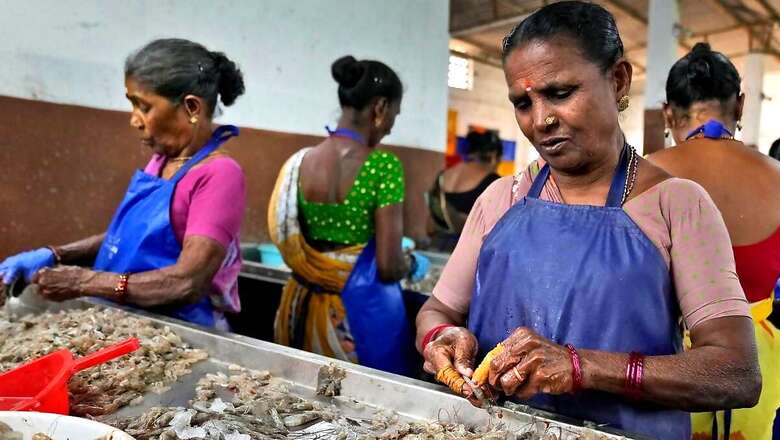
views
Women are integral stakeholders of not only our individual lives, but also our nations and humanity at large, via their support roles as mothers, wives, daughters and sisters, as well as primary roles as competent individuals at the workplace. Modernisation and globalisation have given women an opportunity to work and earn for themselves, further translating into an opportunity to be autonomous and independent beings. Having said this, while there has been a substantial increase in the number of women participating in the workforce, which challenges the traditional notion of men being the sole breadwinners of the family, women still continue to be more vulnerable to exploitation than their male counterparts. The Bangladesh shrimp industry is an apt real-life example that illustrates this precarious position women are trapped in, despite now being able to work.
Bangladesh is a major shrimp producer and exporter in the global market, bringing in not only foreign exchange for the country, but also including the coastal communities into a larger trade network, through shrimp farming. With neo-liberalisation and an increase in the pervasive market relations between local, national and global economies, more jobs are certainly created, but the fact that this increase in jobs largely consists of informal and casual labour is not given enough weight. With capitalisation strengthening its roots deeper and deeper into our societies, well-paying stable jobs are hard to secure, and even harder to keep, while low paying unstable jobs are ever-increasing.
The shrimp industry has various stakeholders that operate in a chain-like system, beginning from the sea, that is, fry collection, all the way up to the national and transnational markets, via middlemen, local depot owners and processing factories. Fry collectors are mostly women, while the other afore-mentioned positions are taken up by men. Other stakeholders also include quality assurance agencies, that ensure that the minimum requirements for food safety, quality, environmental sustainability and labour practices have been met. While such agencies boast about the supreme quality of the goods they certify, there is a stark incongruence between the established ideals and the actual ground practices.
The dominant trend observed in the shrimp industry of Bangladesh is the feminisation of the workforce. Put simply, it means that the number of females in the workforce has risen significantly. As pointed out earlier, while feminisation of the workforce indicates a loosening of the traditional occupational pressures on women, it also traps them in a precarious position, since they are employed at the lower end of the supply chain. The work at this lower end of the chain, includes repetitive tasks such as peeling, de-heading and cleaning of the shrimp that is harvested. In addition to being repetitive, these tasks are also physically harmful, in that they require long working hours (12 to 13 hours) and extremely cold water, with remuneration that barely helps their destitute situation. A large majority of the women also suffer from fungal infections on their hands, that are severe enough to disrupt even their eating. Protective gloves are recommended by the quality assurance agencies, but they incur additional costs to the factories. One may argue that protective gloves may only be a one-time big purchase that will ultimately get covered by the profits that the factory makes. However, the factory owners and the heads at the sub levels dismiss the need for protective gloves, because it slows down the workers, reducing the overall output, and hence also reducing the overall profit made.
Another set of arguments include the justification of why they choose to employ so many women, with a preference for young, unmarried and relatively educated women. The young and unmarried preference most probably stems from the fact that young individuals are easy to intimidate and exploit, just like in child labour practices. Being unmarried inevitably means that these women do not have a male spouse for financial dependence, making them more likely to give into the exploitative demands of the employees without much resistance, putting these women in a ‘beggars can’t be choosers’ situation. What is still unclear, is what the ‘relatively educated’ actually means. Is this preference for education in relation to their male counterparts, or something else? Even if the women were more educated than their male counterparts, it seems unlikely that it would positively impact their pay or the position they acquire.
This educational criterion as being ‘relative’ would make the most sense if we viewed it in relation to the employers of these women. Being ‘relatively less educated’ in comparison to the employers would mean that these women are less likely to be aware of the rights they are entitled to, as workers and citizens. Furthermore, it would prevent them from taking action against the unjust and exploitative work conditions that they are subjected to. Even if the women were aware of their rights, they are unlikely to resist, because resistance risks joblessness, and fighting for these rights legally requires monetary resources, which they do not have, else they would not be working at a shrimp factory. These preferences then, cease to be just preferences, and take on the shape of subtle manipulation, brought on by strategic systematic planning that is bound to work in the favour of the employers.
Other common arguments that are used to deny these women a fair pay is the patriarchal attitudinal bias that supports the baseless notion that “women simply do not have the aptitude for management and commerce” or because “women are more patient than men, hence are perfect for lower paying jobs that require long working hours”. Yet, when women outperform their male counterparts and rake in profits from their work, these are the same people who argue that “women workers are best managed by a woman manager”.
The vulnerability of one, becomes another person’s resource. One of the major factors that shapes the shrimp industry of Bangladesh in the way that it is, the local ecology. The peak season for harvesting shrimp, known as “ghone”, comes only twice each month. During ghone, the demand for casual workers increases, but when the harvesting plateaus out during non-peak season, getting shifts even for low paying jobs becomes Herculean. The women who work at the lower levels, are likely to accept even the unfair conditions placed before them, in order to sustain themselves. Women have to deal with the additional duties of being a homemaker and caretaker, which makes them doubly vulnerable than their male spouses and counterparts, and having unstable and exploitative jobs such as at the processing factories, does nothing to alleviate their problems.
The nature of the workplace is rapidly evolving, given the advancement in technology, access to information and resources. However, the workplace cannot perform to its full capacity unless we make changes in the gender and power relations as well. The Bangladesh shrimp industry is merely a detailed example that reflects the larger, and more large-scale problem at hand, which is an unequal distribution of power and resources that characterize gendered relations at work. Intangible attitudes manifest as tangible behaviours, that eventually have tangible consequences for each one of us and the shared physical and emotional spaces we live in. Thus, it is necessary to first make an attitudinal shift in how we see and choose to treat female workers.
Yashee Jha is an avid commentator on various topical issues. Views expressed in the above piece are personal and solely that of the author. They do not necessarily reflect Firstpost’s views.


















Comments
0 comment